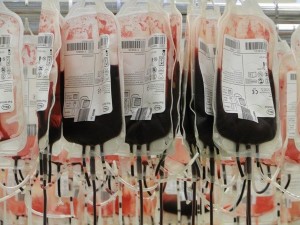 “Thanks to research like this, we are leaning more and more about how best to store blood and give life-saving transfusions. This research is defining practice around the world,” said Dr. Dean Fergusson, senior scientist at The Ottawa Hospital and professor at uOttawa.A large international clinical trial conducted in critically ill children has shown that fresh red cell transfusions (stored for seven days or less) are no better than older red cells (stored for up to 25 days). Transfusing the oldest red cells first is standard practice among many hospitals. However, some hospitals preferentially give fresh cells to critically ill children, even though clinical studies supporting the benefits of this practice have been lacking.
“Thanks to research like this, we are leaning more and more about how best to store blood and give life-saving transfusions. This research is defining practice around the world,” said Dr. Dean Fergusson, senior scientist at The Ottawa Hospital and professor at uOttawa.A large international clinical trial conducted in critically ill children has shown that fresh red cell transfusions (stored for seven days or less) are no better than older red cells (stored for up to 25 days). Transfusing the oldest red cells first is standard practice among many hospitals. However, some hospitals preferentially give fresh cells to critically ill children, even though clinical studies supporting the benefits of this practice have been lacking.
These new findings should reassure doctors that older red cells are just as safe and effective. The randomized trial, published in JAMA, involved nearly 1,500 children from five countries and was co-led by Drs. Dean Fergusson, Philip Spinella, Marisa Tucci, and Jacques Lacroix. This trial complements previous trials in adults and premature babies that have been pivotal in defining global practices for red blood cell storage. All three trials were designed and data-managed by the Ottawa Methods Centre. See media release from the NIH and learn more about transfusion research at The Ottawa Hospital.
“Thanks to research like this, we are leaning more and more about how best to store blood and give life-saving transfusions. This research is defining practice around the world,” said Dr. Dean Fergusson, senior scientist at The Ottawa Hospital and professor at uOttawa.
Authors: Spinella PC, Tucci M, Fergusson DA, Lacroix J, Hébert PC, Leteurtre S, Schechtman KB, Doctor A, Berg RA, Bockelmann T, Caro JJ, Chiusolo F, Clayton L, Cholette JM, Guerra GG, Josephson CD, Menon K, Muszynski JA, Nellis ME, Sarpal A, Schafer S, Steiner ME, Turgeon AF; ABC-PICU Investigators, the Canadian Critical Care Trials Group, the Pediatric Acute Lung Injury and Sepsis Investigators Network, the BloodNet Pediatric Critical Care Blood Research Network, and the Groupe Francophone de Réanimation et Urgences P.
Funding: This trial was funded by the National Institutes of Health, the Canadian Institutes Health Research, the French Ministry of Health, the Quebec Ministry of Health and Social Services, Établissement Français du Sang, Groupe Francophone de Réanimation et d'Urgences Pédiatrique and Washington University in St Louis. All research at The Ottawa Hospital is also supported by The Ottawa Hospital Foundation.
The Ottawa Hospital: Inspired by research. Driven by compassion
The Ottawa Hospital is one of Canada’s largest learning and research hospitals with over 1,100 beds, approximately 12,000 staff and an annual budget of over $1.2 billion. Our focus on research and learning helps us develop new and innovative ways to treat patients and improve care. As a multi-campus hospital, affiliated with the University of Ottawa, we deliver specialized care to the Eastern Ontario region, but our techniques and research discoveries are adopted around the world. We engage the community at all levels to support our vision for better patient care. See www.ohri.ca for more information about research at The Ottawa Hospital.
University of Ottawa: —A crossroads of cultures and ideas
The University of Ottawa is home to over 50,000 students, faculty and staff, who live, work and study in both French and English. Our campus is a crossroads of cultures and ideas, where bold minds come together to inspire game-changing ideas. We are one of Canada’s top 10 research universities—our professors and researchers explore new approaches to today’s challenges. One of a handful of Canadian universities ranked among the top 200 in the world, we attract exceptional thinkers and welcome diverse perspectives from across the globe. www.uottawa.ca
Media Contact
Jennifer Ganton
Director, Communications and Public Relations
Ottawa Hospital Research Institute
Office: 613-798-5555 x 73325
Cell: 613-614-5253
jganton@ohri.ca
